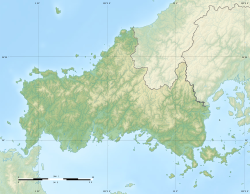| UNESCO World Heritage Site | |
|---|---|
 The tenshu (main keep) of Hagi Castle, in the early Meiji Period | |
| Location | Hagi, Yamaguchi, Japan |
| Part of | "Hagi Proto-industrial Heritage / Hagi Castle Town" part of Sites of Japan’s Meiji Industrial Revolution: Iron and Steel, Shipbuilding and Coal Mining |
| Criteria | Cultural: (ii), (iv) |
| Reference | 1484-004 |
| Inscription | 2015 (39th Session) |
| Coordinates | 34°25′17″N 131°22′53″E / 34.421419°N 131.381389°E |
Hagi Castle (萩城, Hagi-jō) is a Japanese castle located in the city of Hagi, Yamaguchi Prefecture, in the San'yō region of Japan. Built in 1604 at the beginning of the Edo period as the main castle of the Mōri clan, it served as the seat of the Chōshū Domain for over 250 years until 1863. It was demolished in 1874 shortly after the Meiji Restoration. Its ruins were designated a National Historic Site in 1924.[1] Hagi Castle has been designed as a component of the Sites of Japan's Meiji Industrial Revolution: Iron and Steel, Shipbuilding and Coal Mining, which received UNESCO World Heritage Site status in 2015.[2]
- ^ "萩城跡" (in Japanese). Agency for Cultural Affairs.
- ^ "Sites of Japan's Meiji Industrial Revolution: Iron and Steel, Shipbuilding and Coal Mining". UNESCO. Retrieved 21 October 2015.

